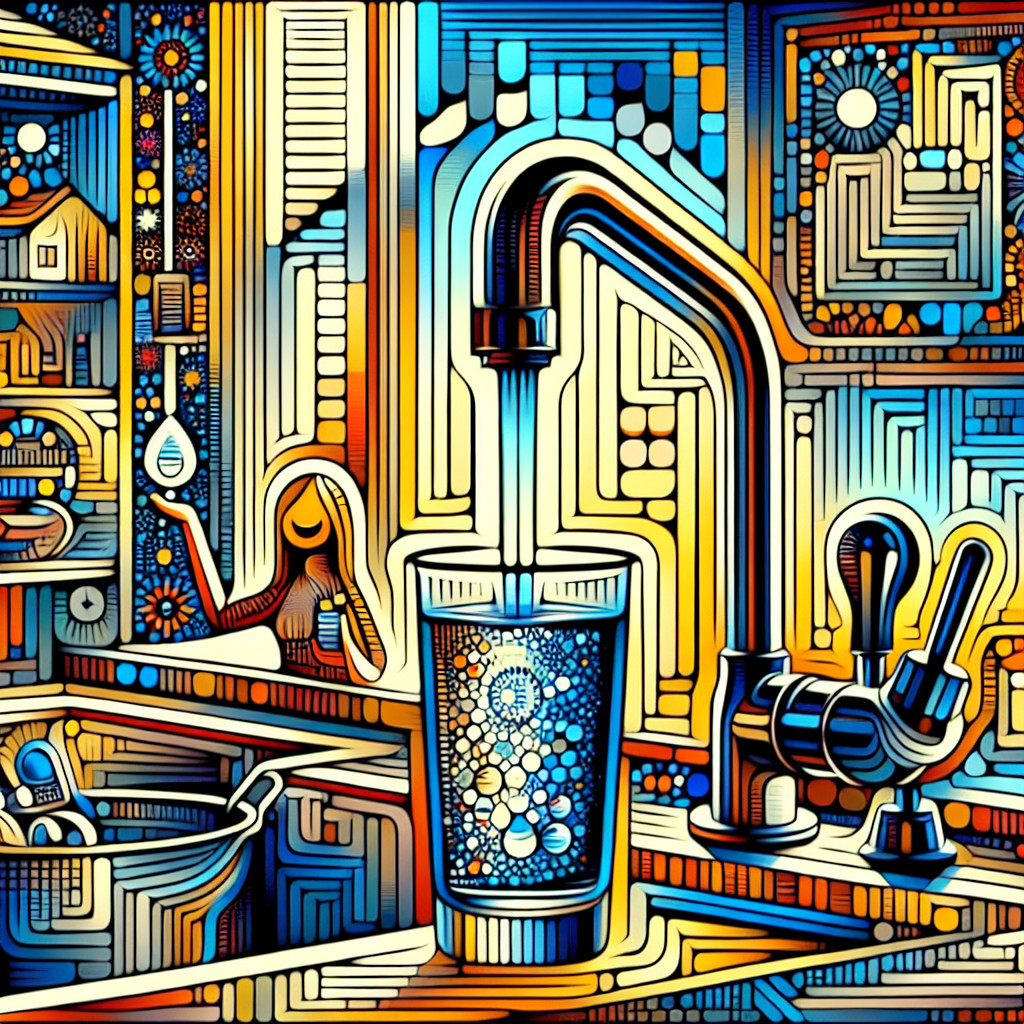-
Table of Contents
“Slovakia’s Tap Water: Pristine, Pure, and Perfectly Drinkable!”
Introduction

Tap water in Slovakia is generally safe and of high quality, meeting the standards set by the European Union. It is sourced from groundwater and surface water, and undergoes rigorous treatment and regular testing to ensure its safety. However, the taste and mineral content can vary depending on the region. In some areas, residents may prefer to use filters or drink bottled water due to the presence of certain minerals or a distinct taste.
Understanding the Quality of Tap Water in Slovakia
In the heart of Europe, nestled between Austria, Hungary, Ukraine, Poland, and the Czech Republic, lies the beautiful country of Slovakia. Known for its rich history, stunning landscapes, and vibrant culture, Slovakia is a destination that captivates many. However, one aspect that often goes unnoticed by many is the quality of tap water in Slovakia. This article aims to shed light on this topic, providing an understanding of the quality of tap water in Slovakia.
Slovakia, like many European countries, has a well-developed water supply system. The country’s tap water is sourced from both surface water, such as rivers and reservoirs, and groundwater. The water undergoes rigorous treatment processes to ensure it is safe for consumption. These processes include coagulation, sedimentation, filtration, and disinfection, which effectively remove any harmful substances and pathogens.
The quality of tap water in Slovakia is regulated by the Public Health Authority of the Slovak Republic, which sets strict standards for water quality. These standards are in line with the guidelines set by the World Health Organization (WHO) and the European Union (EU). Regular testing is conducted to ensure that the water meets these standards. The results of these tests are publicly available, providing transparency and reassurance to the public about the safety of their tap water.
Despite the rigorous standards and testing, the taste and hardness of the tap water can vary across the country. This is largely due to the different sources of water and the varying mineral compositions in different regions. For instance, in regions where the water is sourced from limestone or chalk deposits, the water tends to be harder and have a higher mineral content. This can affect the taste of the water, making it taste more ‘earthy’ or ‘mineral-like’. However, it’s important to note that this does not necessarily mean the water is unsafe to drink.
In fact, the tap water in Slovakia is generally considered safe to drink. Many locals drink it straight from the tap without any issues. However, some people, particularly those with sensitive stomachs or those not used to the local water, may prefer to boil the water first or use a water filter to improve the taste. Bottled water is also widely available for those who prefer it.
Despite the overall high quality of tap water in Slovakia, there are some challenges. Aging infrastructure can sometimes lead to issues with water quality. For instance, old pipes can sometimes leach substances into the water, affecting its taste and safety. The government is aware of these issues and is investing in infrastructure upgrades to ensure the continued safety and quality of the tap water.
In conclusion, the tap water in Slovakia is generally of high quality and safe to drink, thanks to strict regulations and rigorous testing. However, the taste and hardness of the water can vary across the country, and there are some challenges related to aging infrastructure. As a visitor, if you’re unsure about the tap water, it’s always a good idea to ask locals or stick to bottled water. But rest assured, Slovakia is committed to providing its residents and visitors with safe and clean tap water.
The Impact of Environmental Factors on Slovakia’s Tap Water
Slovakia, a landlocked country in Central Europe, is known for its rich history, stunning landscapes, and diverse culture. However, one aspect that often goes unnoticed is the quality of its tap water. The quality of tap water in Slovakia is influenced by a variety of environmental factors, which have a significant impact on its safety and taste.
Slovakia’s tap water is primarily sourced from groundwater and surface water. Groundwater, which is water held underground in the soil or in pores and crevices in rock, is generally of high quality due to natural filtration processes. Surface water, on the other hand, comes from rivers, lakes, and reservoirs, and its quality can vary significantly depending on environmental conditions.
One of the key environmental factors affecting Slovakia’s tap water is pollution. Industrial activities, agricultural runoff, and domestic waste can all contribute to the contamination of water sources. Heavy metals, pesticides, and other harmful substances can seep into the groundwater or be carried into surface water bodies, posing a risk to water quality. The Slovak government has implemented strict regulations to control pollution and protect water sources, but challenges remain.
Climate change is another environmental factor that has a profound impact on Slovakia’s tap water. Changes in temperature and precipitation patterns can affect the availability and quality of water. For instance, increased rainfall can lead to higher levels of runoff, potentially carrying pollutants into water sources. On the other hand, periods of drought can reduce the amount of available water, increasing the concentration of contaminants.
The geographical location of Slovakia also plays a role in the quality of its tap water. The country’s mountainous terrain can influence the flow of surface water and the recharge of groundwater. In areas with steep slopes, water may flow quickly, reducing the time for natural filtration and potentially leading to poorer water quality. Conversely, in flat areas, water may flow slowly, allowing more time for natural filtration and potentially resulting in better water quality.
Despite these environmental challenges, Slovakia has made significant strides in improving its tap water quality. The country has invested heavily in water treatment facilities and infrastructure to ensure that tap water meets the European Union’s stringent water quality standards. These efforts have paid off, with the majority of the population now having access to safe and clean tap water.
However, it’s important to note that the taste of tap water can vary across the country, largely due to differences in water sources and treatment processes. In some areas, the water may have a slightly metallic taste due to the presence of minerals like iron and manganese. In other areas, the water may taste slightly chlorinated due to the use of chlorine in water treatment.
In conclusion, the quality of tap water in Slovakia is influenced by a range of environmental factors, including pollution, climate change, and geographical location. While challenges remain, the country has made significant progress in ensuring that its tap water is safe and clean. However, the taste of the water can vary, so visitors and residents alike may prefer to use a water filter or drink bottled water. Regardless, the story of Slovakia’s tap water is a testament to the country’s commitment to environmental sustainability and public health.
Health Implications of Drinking Tap Water in Slovakia
In Slovakia, the quality of tap water is a topic of considerable interest, particularly in relation to its potential health implications. The country’s water supply system is well-developed and regulated, ensuring that the tap water is generally safe for consumption. However, the quality of tap water can vary significantly across different regions, and there are certain health considerations that individuals should be aware of.
Slovakia’s tap water is sourced from both surface water and groundwater. The surface water, which accounts for approximately 60% of the country’s drinking water, is derived from rivers and reservoirs. The remaining 40% is sourced from groundwater, which is typically of higher quality due to natural filtration processes. Regardless of the source, all tap water in Slovakia undergoes rigorous treatment processes to remove impurities and harmful microorganisms. These processes include coagulation, sedimentation, filtration, and disinfection.
Despite these stringent measures, the quality of tap water in Slovakia can be influenced by a variety of factors. For instance, the presence of certain minerals in the water can affect its taste and safety. High levels of calcium and magnesium, which are common in hard water, can lead to the formation of scale in pipes and appliances. While these minerals are not harmful to health in moderate amounts, excessive consumption can potentially lead to health issues such as kidney stones.
Another concern is the presence of contaminants such as heavy metals, pesticides, and nitrates. These substances can enter the water supply through industrial pollution, agricultural runoff, and natural processes. While the levels of these contaminants in Slovak tap water are generally below the maximum allowable limits set by the European Union, long-term exposure can still pose health risks. For example, high levels of nitrates can cause methemoglobinemia, a condition that reduces the blood’s ability to carry oxygen.
Furthermore, the quality of tap water can also be affected by the condition of the water supply infrastructure. In some parts of Slovakia, particularly in older buildings and rural areas, the water pipes may be made of lead or other harmful materials. This can result in the leaching of these substances into the water, posing a risk to health. Therefore, it is advisable for individuals living in these areas to have their tap water tested regularly.
In conclusion, while the tap water in Slovakia is generally safe for consumption, there are certain health implications that individuals should be aware of. The presence of minerals, contaminants, and harmful substances from the water supply infrastructure can potentially affect the quality of the tap water. Therefore, it is important for individuals to be informed about the quality of their tap water and to take appropriate measures to ensure its safety. This can include regular testing of the water, using water filters, and seeking advice from health professionals. By doing so, individuals can ensure that they are consuming safe and healthy water.
Comparative Analysis: Tap Water in Slovakia vs. Other European Countries
In the realm of water quality, Slovakia holds a unique position among European countries. The tap water in Slovakia is generally considered safe to drink, a testament to the country’s commitment to maintaining high standards of public health. However, a comparative analysis of the tap water in Slovakia versus other European countries reveals a nuanced picture that merits further exploration.
Slovakia’s tap water is sourced primarily from groundwater, which is naturally filtered through layers of rock and soil. This process removes many potential contaminants, resulting in water that is typically clean and safe to drink. The country’s water treatment facilities further ensure the safety of the tap water by employing advanced filtration and disinfection techniques. Regular testing is conducted to monitor the presence of harmful substances such as bacteria, viruses, and heavy metals. The results of these tests consistently demonstrate that Slovakia’s tap water meets or exceeds the stringent safety standards set by the European Union.
However, despite these positive attributes, Slovakia’s tap water is not without its challenges. Some regions of the country, particularly rural areas, have reported issues with water hardness. Hard water, which contains high levels of minerals like calcium and magnesium, is not harmful to health but can cause problems with plumbing and appliances. Additionally, there have been isolated incidents of contamination due to industrial pollution or agricultural runoff. These issues underscore the importance of ongoing water quality monitoring and infrastructure investment.
When compared to other European countries, Slovakia’s tap water quality is generally on par. For instance, countries like Germany, France, and the Netherlands are known for their high-quality tap water, which is rigorously tested and treated. Slovakia’s tap water meets similar safety standards, although the aforementioned issues with water hardness and occasional contamination set it apart.
On the other hand, some European countries face more significant challenges with their tap water. In parts of Eastern Europe, for example, aging infrastructure and inadequate treatment facilities can lead to water that is not safe to drink. In these cases, Slovakia’s tap water is clearly superior.
However, it’s worth noting that perceptions of tap water quality can vary widely, even within the same country. In Slovakia, as in many other European countries, bottled water is a popular choice for many people. This is often due to taste preferences or concerns about tap water safety, despite assurances from public health officials. This phenomenon highlights the complex interplay between objective measures of water quality and subjective perceptions of safety and taste.
In conclusion, the tap water in Slovakia is generally safe to drink and compares favorably to that in many other European countries. However, regional variations and occasional issues with hardness or contamination underscore the need for ongoing vigilance and investment in water infrastructure. As consumers, it’s important to stay informed about local water quality and to make drinking water choices based on reliable information. Whether you prefer tap water or bottled water, the key is to ensure that your water is clean, safe, and enjoyable to drink.
Q&A
1. Question: Is tap water in Slovakia safe to drink?
Answer: Yes, the tap water in Slovakia is generally safe to drink and meets international standards.
2. Question: How is the taste of tap water in Slovakia?
Answer: The taste of tap water in Slovakia can vary depending on the region, but it is generally considered to have a neutral taste.
3. Question: Is bottled water more popular than tap water in Slovakia?
Answer: While tap water is safe to drink, many locals and tourists still prefer bottled water due to personal preference or taste.
4. Question: Are there any issues with the tap water in Slovakia?
Answer: There are no major issues with the tap water in Slovakia, but in some rural areas, the water may have a higher mineral content which can affect the taste.
Conclusion
The tap water in Slovakia is generally safe and of high quality, suitable for drinking and cooking. However, the taste and mineral content can vary depending on the region.






